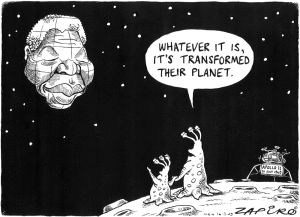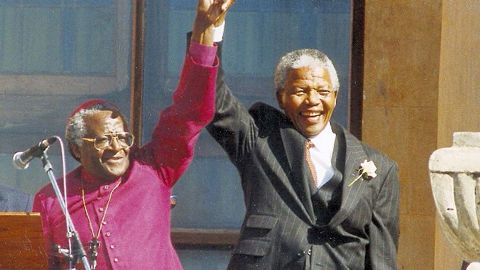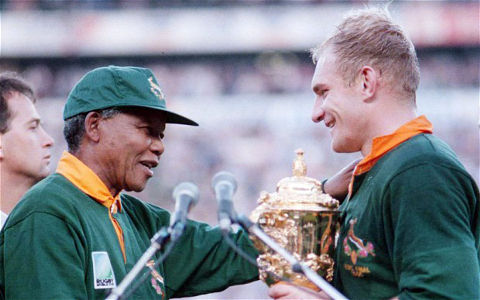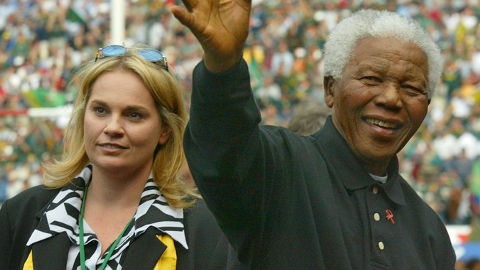- Filologia południowoafrykańska
Suid-Afrikaanse Studies -
South African Studies - Wiadomości
Nuus - News - O nas
Meer oor ons - About us - Program studiów
Curriculum - Pracownicy
Medewerkers - Our team - Studenci
Studente - Students - Platforma e-learningowa
Moodle - Zdjęcia
Foto's - Photo's - Linki
Skakels - Links - Kontakt
Kontak - Contact
On Madiba's death
06.12.2013
 "What counts in life is not the mere fact that we have lived. It is what difference we have made to the lives of others that will determine the significance of the life we lead."
"What counts in life is not the mere fact that we have lived. It is what difference we have made to the lives of others that will determine the significance of the life we lead."
Only occasionally does the death of an individual reverberate through the world with a shared unanimity.
The passing of South Africa's Nelson Madiba on Thursday night would be one of those. By Friday morning messages from political and religious leaders from far and wide have poured in on international news websites. Tens of thousands of celebrities and ordinary beings have added their voice on social networks; a tribute site has crashed frequently over the last 14 hours.
And in a twist of fate, the movie based on his autobiographical No easy walk to freedom, saw its première and international release during the last week.

But his death [and his life] is something that is shared in another way by South Africans. We are a nation still to be defined by ourselves, but the fact that we have a father, a Madiba, or "Tata", suggested that it is possible.
Mandela's stature was not built on the fact that he was a "freedom fighter" and leader of one of the liberation movements in South Africa, that he served 27 years in jail for high treason as defined by the Apartheid regime, and returned victoriously as the first President of a truly democratic South Africa.

Irrespective of what the international community might have thought, his outstanding contribution was the way in which he carefully and nonchalantly built bridges across the many ravines that characterized South Africa. It was his special disarming charm that showed that it was possible to bring together people from different convictions, creeds, ages and races. It convinced skeptics to believe the sincerity of his famous statement from the dock in 1963:
"I have fought against white domination, and I have fought against black domination. I have cherished the ideal of a democratic and free society in which all persons live together in harmony and with equal opportunities. It is an ideal, which I hope to live for and to achieve. But if needs be, it is an ideal for which I am prepared to die."
After 1994, while revengeful colleagues were demanding the removal of the Springbok as the emblem for and name of the South African rugby team [generally rugby was deemed to be a "white" sport and football a "black" one], Madiba refused to be part of this campaign.
If there was one iconic gesture that won him over to white South Africans, it was the day that South African won the Rugby World Cup in 1995. He defiantly donned the jersey of the captain of the team and with Francois Pienaar held the Cup aloft: the new South Africa's first international triumph.

But even more remarkable and enduring, was Mandela's appointment of a white Afrikaans-speaking woman, Zelda Le Grange, as his executive personal assistant/secretary.
Unassuming and ever-present in the immediate background, she continuously represented the fact that from Madiba's perspective there was no need to think of a black world and a white world within the South Africa he represented and envisaged.
Maybe her reaction to the news of the death of the new South Africa's first President, and a Nobel Peace Prize Winner, is one that reflects the true value of this outstanding man:
"My sincere condolences to Mrs Graça Machel [Mum], Maki, Zeni, Zindzi, Josina, Malenga and the entire Mandela family, as well as everyone who feels a sense of loss this morning.
"Nelson Mandela inspired people to forgive, to reconcile, to care, to be selfless, to be tolerant, to maintain dignity no matter what the circumstances. I can attest to each of these because these are the ways in which he changed my life over the past 19 years. I am blessed and honoured by the privilege to have had the opportunity to serve him.
"I often battled with the relentless pressure. But then I looked to him who carried himself with such grace and energy. I never left, I never could. Nelson Mandela did not demand loyalty, but he inspired profound and unwavering loyalty from everybody whose life he touched.

"I am slowly coming to terms with the fact that I will never see him again. But heroes never die. As sad as it makes me that I will never walk into a room again and see his generous infectious smile or hear him say, 'Oh Zeldina, you are here.' I have come to terms with the fact that Madiba's legacy is not dependent on his presence."
Nelson Rolihlahla Mandela was born on 18 July 1918 in the small village of Mvezo, on the Mbashe River, district of Umtata in Transkei, South Africa. His Xhosa name "pulling the branch of the tree", means "troublemaker."
He passed away on 5 December 2013, in Houghton, a posh suburb of Johannesburg.
After a formal State Funeral, he will be buried at the family burial place at Qunu, in the Transkei region of the Eastern Cape.





